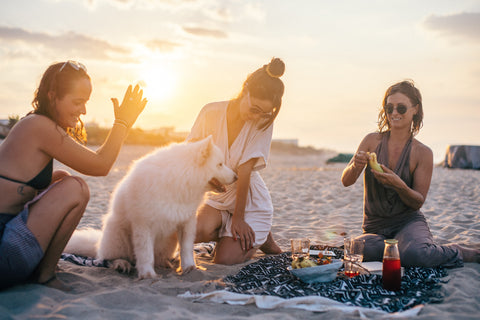Holiday and Travel Tips for Dogs

Taking your dog on holiday may seem idyllic, especially if this will be your pup’s first holiday, but doing a little pre planning can make all the difference between living the dream and a Holiday from Hell!
Pre-checks

- Does your accommodation allow dogs and are there any areas they are not allowed?
- Are dogs allowed on beaches and into places you want to visit?
- Are your dog’s vaccines, flea and worming treatment up to date?
- If going abroad, what documentation do you need? Check with your vet for latest advice?
- Is your dog microchipped (are your contact details up to date?) and do they have a good fitting dog collar and ID tag? Your dog legally needs both a microchip and ID tag in the UK.
- What is the weather going to be like? Very hot or very cold needs planning to ensure your travel companion is comfortable both travelling and whilst at your destination.
- Does your dog find car, train, ferry travel stressful - ask yourself whether taking your dog on holiday is the best thing for them.
- Find the telephone number of a recommended local vet and 24hr emergency veterinary service, local to where you are staying.
Things to pack

- A familiar blanket, bed, crate & or teddy
- Their normal food - rich holiday treats can cause upset tummies
- A large water bottle and travel bowl
- Dog first aid kit
- Familiar toys
Things to think about while on holiday

- Allow your dog time to settle into their new surroundings, with you there.
- Make sure they know where their crate, bed and water bowl are.
- Try to keep to similar exercise, feeding and rest routines.
- Don’t leave your dog unsupervised in rented accommodation or hotel rooms, where they could become scared by new sounds or sights.
- If you do leave your dog, ensure they have something to keep them busy to prevent bad behaviour caused by boredom.
- Be aware of dangers such as wires, dangerous foods, vegetation and wildlife which could harm your dog.
- Never leave your dog in a car during the summer months even if it isn't sunny.
- Know the signs of heat stroke in dogs. Ensure you and your dog take breaks from the heat on hot days and always have water on hand.
Remember: all dogs act differently when their usual surroundings are changed. Be patient and calm with them and ensure you don’t end up with an overtired pup.

